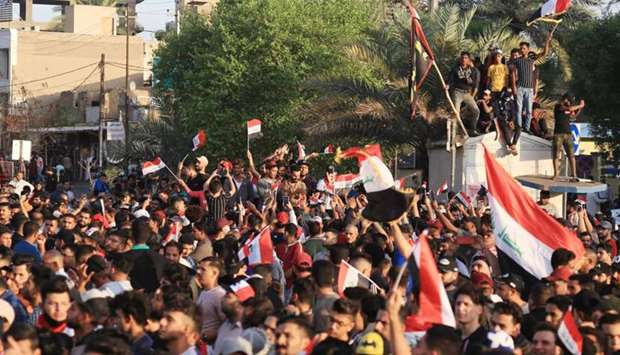Eight demonstrators died in renewed rallies across Iraq's capital and the south on Friday, with the first reported use of live rounds in this wave of protests.
The demonstrations were the second phase of a week-long movement in early October demanding an end to widespread corruption, unemployment and an overhaul of the political system.Activists urged Iraqis to return to the streets on Friday, which marks a year since Prime Minister Adel Abdel Mahdi came to power.
But the rallies began early, with hundreds already gathering in the capital's iconic Tahrir (Liberation) Square on Thursday evening.
On Friday, many crossed the bridge to mass near Baghdad's Green Zone, which hosts government offices and foreign embassies, but security forces used a volley of tear gas to push them back.
"Two demonstrators died, with preliminary information indicating they were hit in the head or face by tear gas canisters," said Ali Bayati, a member of the Iraqi Human Rights Commission.
He said nearly 100 more were wounded, but there were no reports of live fire being used to disperse protesters in the capital.
In the southern city of Nasiriyah, however, medical and police sources told AFP that five protesters were shot dead and another 18 were wounded.
Thousands had gathered there in the afternoon, setting fire to the government's provincial headquarters.
An eighth protester died of burns sustained when demonstrators set fire to several political party offices in another southern town.
"We're not hungry -- we want dignity!" a protester shouted in Baghdad on Friday morning, while another lashed out at "the so-called representatives of the people who have monopolised all the resources".
One in five people lives in poverty in Iraq and youth unemployment sits around 25 percent, according to the World Bank.
The rates are staggering for OPEC's second-biggest oil producer, which Transparency International ranks as the 12th most corrupt state in the world.
"I want my share of the oil!" another protester told AFP.
Iraq's highest Shiite authority Grand Ayatollah Ali al-Sistani had set Friday as the deadline for Abdel Mahdi to respond to demonstrators' demands.
In a much-awaited sermon, Sistani's representative urged protesters and security forces to show "restraint," warning of "chaos" if violence broke out again.
His sermon appeared to echo the package of reforms put forward by Abdel Mahdi, including an anti-corruption campaign, a job creation drive and improved social welfare.
But demonstrators did not appear impressed.
"Adel Abdel Mahdi is lying to us," protesters shouted in Baghdad, just hours after the premier's televised appearance in which he defended his reform agenda.
"They are all liars -- they lie when they promise us jobs and when we protest, they fire tear gas at us!" shouted another.
Security forces unleashed tear gas canisters on Friday to disperse thousands of protesters around Baghdad's high-security Green Zone, which hosts government offices and embassies.
But the real test was to be later in the afternoon, when many were expecting supporters of Moqtada al-Sadr -- an influential cleric who controls the largest parliamentary bloc -- to hit the streets.
His supporters have breached the Green Zone in previous years. This week, he called on them to protest and even instructed members of his own paramilitary force to be on "high alert".
They could be seen in parts of Baghdad on Friday in a clear show of force.
The movement is unprecedented in recent Iraqi history both because of its spontaneity and independence, and because of the brutal violence with which a torrent of protests on October 1-6 was met.
At least 157 people were killed, according to a government probe published on Tuesday, which acknowledged that "excessive force" was used.
A vast majority of them were protesters in Baghdad, with 70 percent shot in the head or chest.
Some have backed the government, including the powerful Hashed al-Shaabi paramilitary force whose political branch is the second-largest parliamentary bloc.
And Iraq's mostly-Kurdish north and Sunni west have stayed out of the protests.
Iraq has been ravaged by decades of conflict that finally calmed in 2017 with a declared victory over the Islamic State group.
Thus began a period of relative calm, with security forces lifting checkpoints and concrete blast walls and traffic choking city streets at hours once thought too dangerous.
Restrictions had even softened around the Green Zone but were reinstated as the October demonstrations picked up in Tahrir Square, which lies just across the Tigris River.
Authorities also imposed an internet blackout, which has been mostly lifted although social media remains blocked.

